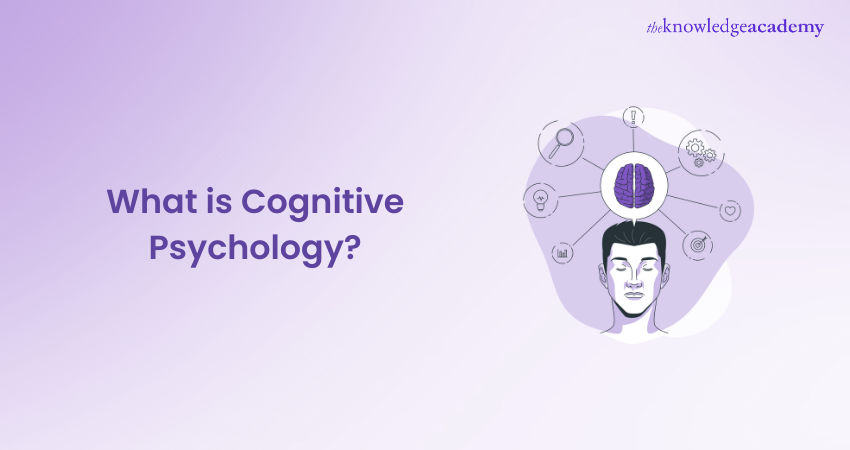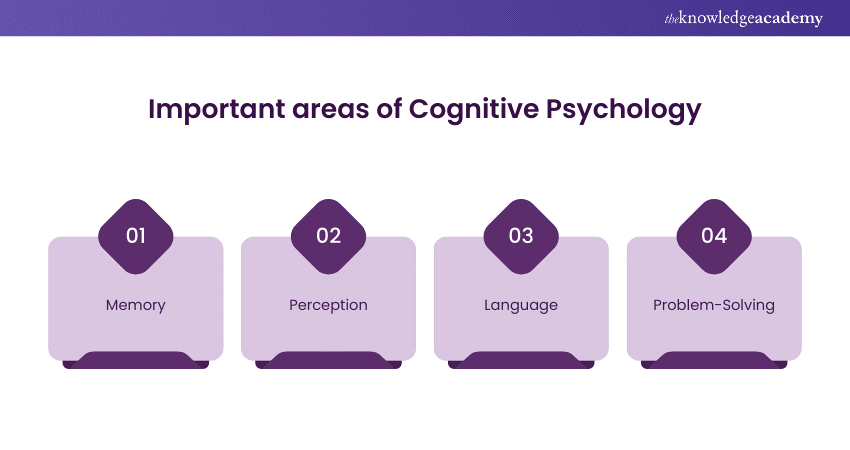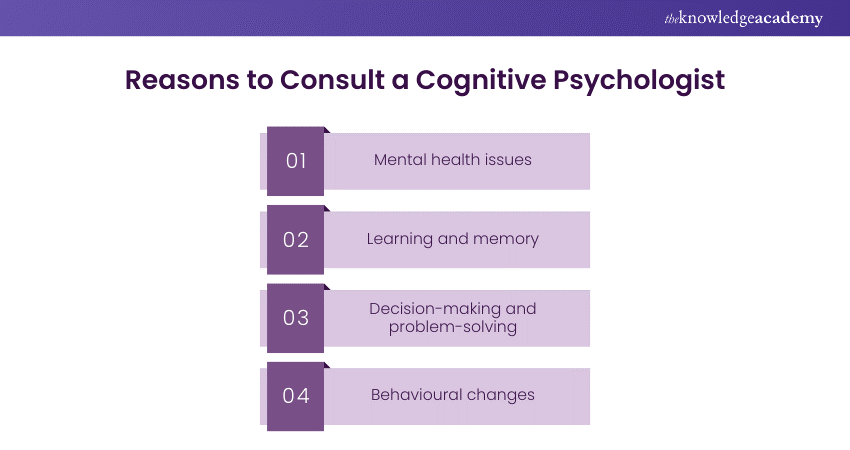We may not have the course you’re looking for. If you enquire or give us a call on 0800 446148 and speak to our training experts, we may still be able to help with your training requirements.
Training Outcomes Within Your Budget!
We ensure quality, budget-alignment, and timely delivery by our expert instructors.

Ever felt that rush of triumph when you crack a puzzle, solve a tricky math problem, or master a new language? Have you ever wondered what powers these achievements? This question leads us to the ultimate enigma—the human mind. It’s one of the most intricate puzzles we can explore, and the answers lie in the fascinating field of Cognitive Psychology.
Cognitive Psychology, which took off in the 1950s, explores how we perceive, pay attention, recognise patterns, represent knowledge, and more. This blog dives into the most thrilling aspects of this field, from Cognitive Behavioural Therapy to career opportunities and the vital role of Cognitive Psychologists. Ready to dive in? Let’s go!
Table of Contents
1) Cognitive Psychology Definition
2) Important Areas of Cognitive Psychology
3) History of Cognitive Psychology
4) Cognitive Psychology Approach in Practice
5) Careers in Cognitive Psychology
6) Reasons to Consult a Cognitive Psychologist
7) Conflicts and Debates
8) Conclusion
Cognitive Psychology Definition
Cognitive Psychology is a branch of Psychology that studies mental processes, including how we acquire, process and store information. It largely focuses on the internal processes like attention, perception and memory. The other processes that it also aims to explain are language, problem-solving, and decision-making.
Cognitive Psychologists strive to decipher how we think and why we behave the way we do, providing insights into our mind and its interactions with the world.
Important Areas of Cognitive Psychology
As discussed, Cognitive Psychology focuses on the inner workings of our mind. Here are the most important areas that it strives to understand.

Memory
Memory is a fundamental concept in Cognitive Psychology that focuses on how knowledge is taken in, stored and retrieved. Some of the questions that are pursued by researchers include: "Why do we forget certain things?" or "How can we improve memory recall?" For example, research that focuses on memory consolidation highlights how much sleep is important in optimising memories.
Perception
Perception involves how we interpret sensory information to understand our environment. Cognitive Psychologists study things like visual illusions to reveal how our brains process deceptions. It further explains why we may sometimes perceive things that aren’t really there.
Language
Another important area of research is language processing which is concerned with the comprehension and generation of language. This entails examining how children learn to speak and how adults understand speech and how they write it. It helps in the formulation of improved educational tools and equipment as well as communication gadgets.
Problem-solving
Applied research focuses on the ways in which we deal with different issues. Cognitive Psychology deals with how we approach challenges, make choices and learn in new environments. This knowledge is used in fields such as education, which focuses on creating good learning techniques to address problem-solving skills.
Learn to manage stress mindfully and build resilience with our Handle Stress And Develop Your Resilience Training - register now!
History of Cognitive Psychology
Cognitive Psychology gained popularity from the 1950s to the 1970s as researchers became more interested in how thinking affects behaviour. This period is called the "cognitive revolution" and represents a shift in thinking and focus for psychologists. Here are some key points regarding the evolution of Cognitive Psychology:
1) Before this time, the behaviourist approach dominated psychology. The behaviourists only studied external behaviour that could be measured.
2) Behaviourists believed it was pointless to study the mind because there was no way to objectively measure what transpires in someone's thoughts. Consequently, the mind was seen as a black box that couldn't be calculated.
3) The cognitive approach inspired the idea that internal mental behaviour could be studied using experiments.
4) Cognitive Psychology assumes an internal process happens between the occurrence of a stimulus and when you respond to it.
5) These are mediational processes involving perception, attention, memory, problem-solving, or other methods. Cognitive Psychologists believe that if you want to understand behaviour, you must understand the mediational processes that cause it.
The Cognitive Psychology Approach in Practice
Cognitive Psychology has greatly benefited the treatment of mental health issues. Until the 1970s, the provision of mental health care mainly embraced psychoanalytic, behavioural and humanistic approaches.
The coming of the "cognitive revolution” brought focus to how people thought. It made people curious about how their ways of thinking could play a part in their psychological disorders. This change led to the emergence of new approaches to address certain diseases like depression, anxiety disorders as well as phobias.
What is Cognitive Behavioural Therapy?
Cognitive Behavioural Therapy (CBT) is a widely used therapeutic approach. It combines cognitive and behavioural techniques to treat mental health issues. CBT focuses on identifying and challenging negative thought patterns that affect behaviours. Then, replace them with healthier, more adaptive ones. It has been proven effective in treating conditions such as depression, anxiety, PTSD, and OCD, making it a cornerstone of modern psychotherapy.
Careers in Cognitive Psychology
Cognitive Psychology offers diverse career opportunities across various sectors. Professionals in this field may work in academia, research, healthcare, or industry, applying their expertise to solve real-world problems.
Academic and Research Positions
Many Cognitive Psychologists work as University Professors or Researchers, conducting studies to advance our understanding of mental processes. They may teach courses, mentor students, and publish their findings in academic journals.
Clinical and Counselling Roles
Cognitive Psychologists can also work as clinical or counselling Psychologists. They use their knowledge to diagnose and treat mental health issues. They often employ CBT and other evidence-based therapies to help clients overcome challenges and improve their mental health.
Aid in creating a safe space for everyone around you with our Mindfulness Training - sign up now!
Industry and Technology
In the tech industry, Cognitive Psychologists contribute to the development of user-friendly interfaces, Artificial Intelligence (AI), and human-computer interaction. Their insights make sure that technology is designed in ways that align with human cognitive capabilities.
Educational Consulting
Cognitive Psychologists collaborate with educational institutions to design curricula and teaching strategies that optimise learning and memory retention. By applying principles from Cognitive Psychology, they create impactful educational programs and assessments.
Reasons to Consult a Cognitive Psychologist
Here are the reasons to consult a Cognitive Psychologist:

1) Mental Health Issues: Cognitive Psychologists use evidence-based therapies like CBT. It can be used to address conditions such as anxiety, depression, and PTSD. This can help clients develop healthier thought patterns and behaviours.
2) Learning and Memory: They can assist in developing strategies to improve memory and learning skills. It is particularly useful for students and individuals with learning difficulties.
3) Decision-making and Problem-solving: Cognitive Psychologists help enhance problem-solving and decision-making abilities. They are beneficial for both personal growth and professional development.
4) Behavioural Changes: They support individuals in making significant behavioural changes. It can help people quit smoking or manage stress, by altering cognitive patterns.
Conflicts and Debates
Since the dawn of perception, there have been conflicts, here are some important conflicts and debates in Cognitive Psychology:
Free Will vs Determinism
The debate between free will and determinism explores whether our behaviours are driven by internal and external factors. Or if we have the autonomy to choose our actions. Cognitive Psychologists examine the extent to which cognitive processes are influenced by genetics, environment, and personal agency.
Nature vs Nurture
This longstanding debate of Nature vs Nurture questions the relative contributions of genetic inheritance (nature) and environmental factors (nurture) to human development. Cognitive Psychology studies how these elements interact to shape our cognitive abilities and behaviours. This offers insights into human potential and individual differences.
Holism vs. Reductionism
Holism and reductionism are approaches to studying cognitive processes. Holism considers the whole system. In contrast, reductionism breaks down processes into simpler parts. Both perspectives provide valuable insights but also have limitations in fully understanding complex mental functions. Cognitive Psychologists often integrate both approaches to gain a comprehensive understanding of Cognition.
Idiographic vs. Nomothetic
The idiographic approach focuses on individual cases and personal experiences. In contrast, the nomothetic approach seeks general laws applicable to all individuals. Cognitive Psychologists use both methods to balance personalised understanding with broader generalisations, enriching the study of human Cognition.
Conclusion
In conclusion, Cognitive Psychology provides a fascinating glimpse into the workings of the human mind. The insights we gain from Cognitive Psychology not only expand our knowledge of human behaviour but also contribute to advancements in therapy, education, and even Artificial Intelligence. We hope this blog helps you gain deeper insight into the wonders of Cognitive Psychology.
Learn how you can prevent psychological distress that can lead to extreme adversities - sign up for our Prevention Psychology Training now!
Frequently Asked Questions

Cognitive Psychology primarily focuses on understanding mental processes like perception, memory, reasoning, and decision-making.

Cognitive Psychology can improve everyday life by enhancing learning strategies, improving memory, and developing better problem-solving skills.

The Knowledge Academy takes global learning to new heights, offering over 30,000 online courses across 490+ locations in 220 countries. This expansive reach ensures accessibility and convenience for learners worldwide.
Alongside our diverse Online Course Catalogue, encompassing 17 major categories, we go the extra mile by providing a plethora of free educational Online Resources like News updates, Blogs, videos, webinars, and interview questions. Tailoring learning experiences further, professionals can maximise value with customisable Course Bundles of TKA.

The Knowledge Academy’s Knowledge Pass, a prepaid voucher, adds another layer of flexibility, allowing course bookings over a 12-month period. Join us on a journey where education knows no bounds.

The Knowledge Academy offers various Mental Health Courses, including the Mental Health and Wellbeing Training Course and the Mindfulness Course . These courses cater to different skill levels, providing comprehensive insights into The Importance of Psychological Safety in the Workplace.
Our Health & Safety Blogs cover a range of topics related to Psychology, offering valuable resources, best practices, and industry insights. Whether you are a beginner or looking to advance your knowledge on Mental health, The Knowledge Academy's diverse courses and informative blogs have you covered.
Upcoming Health & Safety Resources Batches & Dates
Date
 Anxiety Courses
Anxiety Courses
Fri 24th Jan 2025
Fri 21st Mar 2025
Fri 2nd May 2025
Fri 27th Jun 2025
Fri 29th Aug 2025
Fri 3rd Oct 2025
Fri 5th Dec 2025







 Top Rated Course
Top Rated Course



 If you wish to make any changes to your course, please
If you wish to make any changes to your course, please


